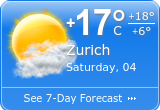Switzerland. Country information |
Due to its location, Switzerland has traditionally been and will continue to be at the cross-roads of major
international trade routes. From Switzerland, the gateway of Europe, you can reach all major cities of the
Continent in two hours or less.
This is one of the reasons why Switzerland become a center for international
business contacts and organizations.
|
Political system
 As its name implies, the Swiss Confederation is based
on a federal system. The present form was established by the Constitution of 1848. It superseded the previous federation
of independent states and recognized that the country’s unity could only be preserved if full consideration was
given to the diversity of its regions. As its name implies, the Swiss Confederation is based
on a federal system. The present form was established by the Constitution of 1848. It superseded the previous federation
of independent states and recognized that the country’s unity could only be preserved if full consideration was
given to the diversity of its regions.
Under the current Constitution, which became effective at the beginning of 2000, Switzerland is made up of 26
Cantons. The historically evolved federal structure gives the Cantons a considerable degree of political freedom
and administrative autonomy.
Switzerland’s internal stability isn’t impaired by the existence of different language groups and cultural regions.
There is a high degree of tolerance and personal freedom.
According to the World Competitiveness Yearbook 2017,
Switzerland leads all international comparisons in matters of security, private prosperity, social coherence and political
stability.
|
 Administrative data Administrative data
|
Area
Capital City
Currency
Languages
Structure
|
- 41,293 sq.km
- Bern
- Swiss Franc
- German
- French
- Italian
- 26 cantons
|
 Population data Population data
|
Residents
Swiss citizens
Foreign residents
|
- 8,036,900
- 6,168,000
- 1,868,900
|
 Economic data Economic data
|
Inflation
Unemployment
Taxes
Working time
|
- below 0.1%
- below 3.5%
- below 25%
- 40-44 hours
per week
|
|
Population and economic
highlights
Zurich with its 0.35 Mln. population is the commercial center of Switzerland. Bern (0.13 Mln.) is the political
capital. Basel (0.18 Mln.) is the domicile of renowned pharmaceutical and chemical companies, and Geneva (0.18 Mln.)
is the headquarters of numerous international organizations. Lausanne and St. Gallen are world-renowned education
centers, and Lucerne is a famous meeting point of culture and tourism.
Smaller agglomerations with an economic profile are Lugano as a banking and tourism center, Winterthur with a
medical technology base, and Neuchatel with electronics and micro-technology centers.
According to the Global Competitiveness Report 2017-2018 Switzerland is the
world’s most competitive economy.
Human capital
With respect to the productivity of the labor force, Switzerland ranks number 2 among the world’s national economies.
The workforce is generally highly motivated, as confirmed through international studies
(see Work Motivation).
The Swiss labor market is characterized by a liberal labor law, low regulation density and outstanding social stability.
Labor conflicts are solved through negotiations between the social partners.
The labor costs depend not only on the direct wage and ancillary wage costs, but also on the total number of hours worked
per year and the costs of absenteeism. In Switzerland, the annual working hours are longer than in other European
countries. Absenteeism due to illness and other reasons is low. Strikes are practically non-existent.
|
|
|










